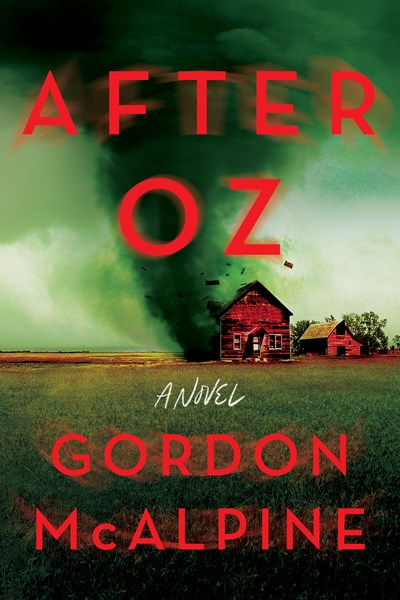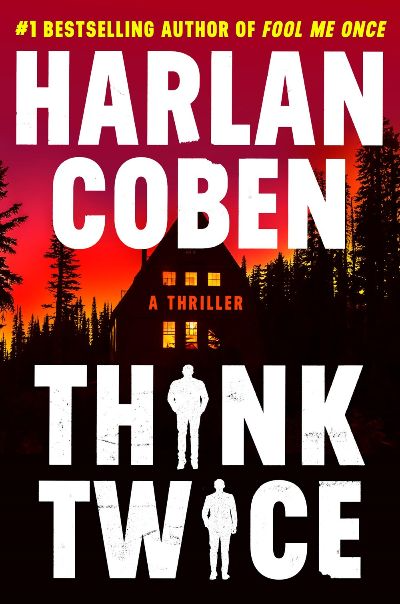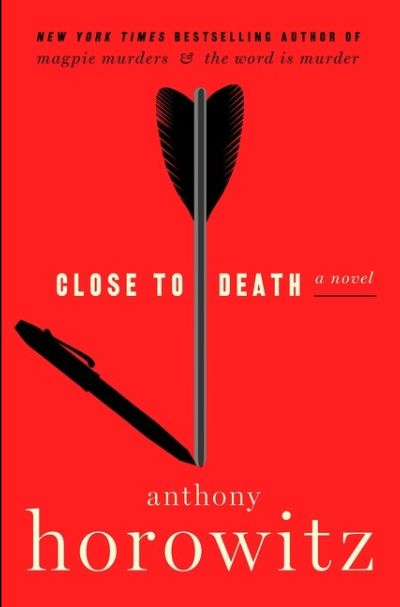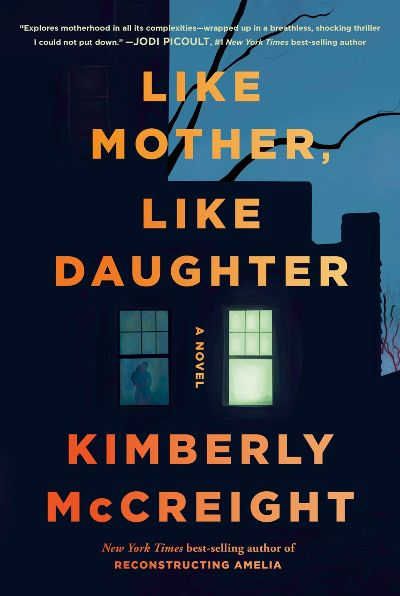A wonderful addition to the literature of The Wizard of Oz, this novel focuses on 11-year-old Dorothy Gale, “dreamy, distant, difficult,” and her eventual return to Kansas via a pumpkin field, where she is found sleeping. Poor Dorothy didn’t know the drill—she was insistent on the reality of the fantastic land she had left, with “talking beasts, flying monkeys, and a wizard”—when she should have been accusing the Oz citizenry as being ungodly pagans. But it’s Dorothy’s admission that she murdered (actually melted) the witch, and the discovery that a leading, witch-like townswoman, Alvina, has also been murdered (melted by lye), that sends Dorothy off to the Topeka Insane Asylum. Fortunately for Dorothy, the town is visited by Dr. Evelyn Grace Wilford, a student of William James, who faces the misogyny and Christianity of the townspeople to learn the truth of what really happened to Dorothy Gale. A delight from start to finish.
Review
Sports agent and former attorney Myron Bolitar works closely with his best friend, Win, in a lavish office in New York City. FBI agents visit one day and demand answers. One of Myron’s former clients, Greg Downing, is the prime suspect in a couple of murders, as his DNA was found under a victim’s fingernails. The only problem? Greg died three years ago, and Myron last saw him at his funeral. Myron and Greg had a history, and being curious how a dead man could murder someone, Myron asks Win for help, and they start digging for answers. Mobsters, false identities, and a string of murders committed by innocent people are only the tip of the iceberg in Coben’s latest. Myron and Win’s stories are personal favorites, and their relationship, banter, and puzzle-solving skills make for a great series. Think Twice is a classic story with a favorite duo and another great Coben thriller full of surprises and misdirection. Here’s hoping we meet these partners in action again soon.
Things couldn’t get much worse for Ellery. She’s all alone at a super-expensive resort in Big Sur where she and her husband were meant to celebrate their twentieth anniversary, except his mid-life crisis blossomed into a full blown decision to divorce (new girlfriend and motorcycle), and, well, the reservations aren’t refundable. Then it turns out that most of the other guests are there to celebrate a wedding. How annoying is that? Ellery misses her kids terribly. And when she decides to take an evening dip in the infinity pool, she finds the groom beat her to it, except he’s floating face down, fully dressed, with a huge gash in the back of his head. Time to call the cops, but a huge storm has moved through, triggering a mudslide that completely isolates the hotel, cutting off cell service. Yup, we are in a closed-resort novel. But, fortunately for Ellery, she makes some friends, and together they set out to investigate what’s really going on in this Christie-like setting. This is Condie’s adult debut (she is author of the YA “Matched” series) and she does a magnificent job of balancing the search for a murderer with exploring Ellery’s rich internal life. A gift to readers who enjoy closed environments and unsettling outcomes.
This sequel to Trussoni’s 2023 The Puzzle Master (my favorite book of all time!) finds savant Mike Brink once more faced with a puzzle that others have found unsolvable. This time his help is requested by the Japanese imperial family, who dispatch another puzzle genius, Sakura Nakamoto, to whisk him from New York to Tokyo. Mike is well known for his work creating puzzles and taking part in competitions in which participants recite the string of numbers that form pi, his synesthesia allowing the numbers to appear “as a scale of color at the edge of his vision.” These are the upsides of the accident that left him an affable genius. But there are drawbacks. He’s so far been unable to form any romantic relationship and struggles to understand himself. So when Sakura tells him that the beautiful Dragon Puzzle Box, a puzzle that’s uber-famous in Mike’s world, is available for him to try, and that it will help him to understand his gift, he jumps at it. This is no ordinary box—others who have tried to open it have had fingers amputated or been poisoned by the puzzle’s booby traps. Work on it takes Mike on thrilling journeys not only to fascinating Japanese locales but further into the recesses of his mind than he thought possible. Engrossed readers will happily make the trips with him. While you’re waiting for this wonderful follow-up, get The Puzzle Master and read our interview with Trussoni when that book was published.
Mavis is one busy single mom. Pearl, her seven-year-old, is smart, funny, and chatty. Her ex, who tries to be a good dad, is a musician who is regularly on tour across the country. The non-profit Mavis works for has the bad habit of skipping her over for promotions. And Trish, the incredibly bossy head of the PTA—when will a house fall on her?—tricks Mavis, as one of only a handful of Black moms at the school, to head its DEI committee. “DEI means diversity, equity, and inclusion, sure,” Mavis says. “But it also means free labor to be given willingly to fix problems we didn’t create.” The novel is barely underway when the new school principal suddenly disappears while Mavis, while walking her dog late at night, passes the school, only to see Trish loading up her car with cleaning supplies and heavy plastic bags…filled with the remains of Principal Smith? Joining forces with Jack, the “superhot” school psychologist, Mavis sets off to find the lost principal. Beautifully written and well-paced, this delightful novel explores the many friends and family who surround Mavis, the struggles she experiences, and the love that flows throughout. Elise Bryant is the NAACP Image Award-nominated author of the young adult novels Happily Ever Afters, One True Loves, and Reggie and Delilah’s Year of Falling.
If you like a jaw-dropping twist, this is the book for you, and I mean the reaction literally: at one point in this great domestic drama, one character whispers a closing remark to another that literally made my mouth hang open. And that wasn’t the last surprise. The drama concerns a missing child, Laika Martenwood, whose English family’s treatment by the media after she’s gone will remind readers of the real-life McCann family, dragged through the tabloids after their daughter was snatched. The Martenwoods are more dysfunctional than even the tabloids say, though. The father is one of the most loathsome characters to come along in a while; his wife is so psychologically abused that she can’t leave and can’t protect her children from him; and daughters Willa and Laika are relentlessly mocked and bullied by the horrible man. As the book opens, we find Willa as an adult, barely hanging onto the life she’s cobbled together while agonizing over whether her sister is still alive, where she could be, and what happened to her all those years ago. Moving back and forth in time, Collins puts the media and family ties under a magnifying glass, in the process reminding readers that just as things don’t break on their own, they don’t have to stay broken.
This fifth in the Hawthorne and Horowitz series is a delightful homage to the classic crime fiction of Agatha Christie’s era, complete with a “locked room” episode and a tight little community. With just six homes, nestled among beautiful gardens, it’s hard to imagine that Riverside Close is actually located in London. But then the Kentworthy family moves into the Close with their noisy, brutish children, four cars that block the neighbors from parking, and plans to replace a garden with—shudder—a pool, changing room, and bar. Compromise would not seem to be in finance-bro Charles Kentworthy’s make-up, and his oafish behavior provokes the remaining five occupants—each odder than the one before—to swear that they could kill him. Which one of them does. In the very dramatic method of shooting him with a crossbow. Here things really take off as Detective Daniel Hawthorne takes up the case, with Horowitz more of a background player than in previous books, authoring a third-person narrative. Newcomers should not feel intimidated by the series and feel free to jump in here. The compelling plot, wonderful location, and marvelous shots of humor will be sure to pick up the reader and buoy them along.
Cleo, a student at NYU, has a tumultuous relationship with her mother, and that hatred gets tested in McCreight’s latest domestic thriller. Cleo’s mom, Kat, begs her to come for dinner, and Cleo reluctantly agrees. Arriving late, she finds food burning in the oven and on the stovetop and blood on a shoe, but no Kat. What happened to her mom? As she searches for answers from her father and friends, she quickly learns that everyone has secrets, and the mom she wanted to avoid was not the woman she thought. The story jumps between Cleo trying to find the truth and Kat, from two weeks before her disappearance, trying desperately to hide from her past and keep Cleo from discovering everything. Even the most jaded readers will not anticipate all the surprises here. McCreight, who knows how to keep the pages turning, has become one of the best in the psychological thriller genre. She has another bestseller on her hands.
Millie Turner is the envy of 1908 New York. She nabbed the catch of her season, marrying devastatingly handsome financier Charles Turner. They’ve moved to Oyster Bay, Long Island, and live in a house Millie inherited, which is now decorated too ostentatiously for her liking—there’s a taxidermied zebra!—but what Charles wants, Charles gets. Millie is nervously but happily hosting a lavish party when suddenly everything changes—she wakes up to a freezing, dark house, with the party over and the guests gone. Nobody will tell her what ’s happened, but she slowly learns that after a crime was committed at the party, she took a weeks-long “rest cure”—a drug-induced sleep prescribed at her husband’s wishes. Millie has had a terrible upset, they say, and since hysteria “can lead to immoral behavior [and] make you ungovernable,” there’s no time to waste: she must enter an institution. Thus begins Millie’s fight for her life. The first-person narrative, told from the young woman’s point of view, is both shocking and exciting, moving from grand ballrooms to flophouses and from shady business dealings to the honesty of pure love. A lengthy court battle will keep readers deliciously on edge in James’s (The Woman in the Castello, 2023) shocking and gripping drama.
Do you love books that take you to new places, especially if it’s unlikely you will ever visit them in person? Me too. And Downes’s thriller does exactly that, bringing us to the dramatic coastal highways of Western Australia and setting us down among the “vanlifers,” who are exploring the coast while living out of their souped-up vehicles. But this isn’t a Fodor’s Travel Guide. We’re following Katy Sweeney, who’s hit the road in hopes of finding her sister, Phoebe, a sort of solo travel influencer, who disappeared a year ago. The case has grown cold and the cops have all but given up when Katy meets Beth, another young woman who has her own reasons for disappearing into the anonymous van world, a world often hostile to women. The two pair up—Beth is pretty destitute—and use Phoebe’s social-media posts to retrace her steps along the coast. Documenting a true road trip from hell, this fast-moving suspense novel eventually arrives at a resolution that is both terrifying and shocking, turning everything we have come to believe inside out and upside down.










